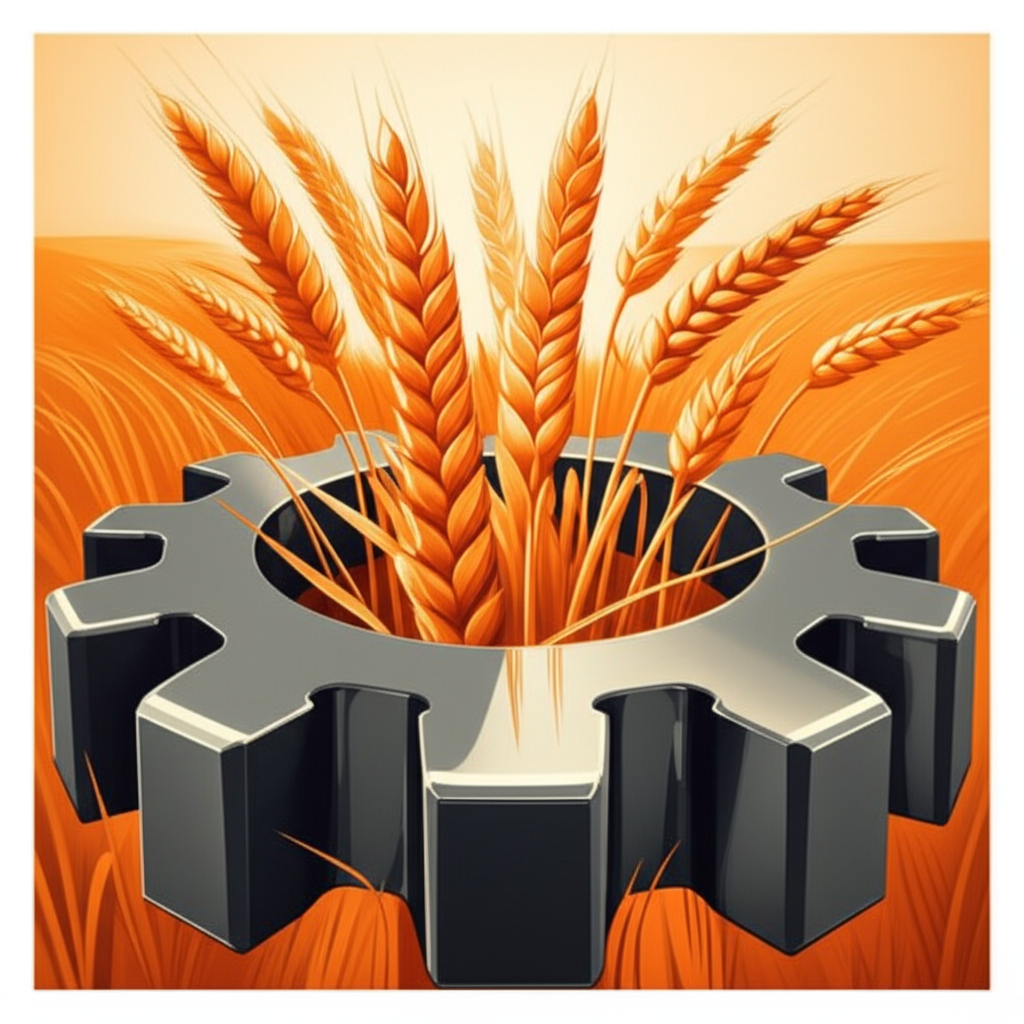Custom Forged Parts: The Key to Agricultural Durability

TL;DR
Custom forged parts for agricultural machinery deliver superior strength, durability, and resistance to wear, making them essential for high-stress applications. The forging process creates components with an optimized grain structure that significantly outperforms cast or machined alternatives. This leads to longer equipment lifecycles, reduced downtime, and lower long-term operating costs for tractors, combines, and other critical farm equipment.
The Critical Role of Forged Components in Modern Agriculture
Modern agricultural machinery operates in some of the most demanding environments imaginable. Equipment is subjected to constant high torque, repetitive impact, and abrasive wear from soil and crop materials. From tillage components that strike rocks to powertrain parts that transfer immense power, every component must be built for maximum resilience. Downtime due to part failure is not just an inconvenience; it's a direct hit to productivity and profitability, especially during critical planting and harvesting seasons.
This is where the metallurgical superiority of forging becomes indispensable. Unlike casting, which involves pouring molten metal into a mold and can result in porosity or a random grain structure, forging mechanically shapes a solid piece of metal under immense pressure. As detailed by experts at Trenton Forging, this process refines the metal's internal grain structure, aligning it to the shape of the part. This continuous, unbroken grain flow results in components with exceptional tensile strength, fatigue resistance, and impact durability. The forging process effectively eliminates internal voids and defects, creating a denser, more reliable part.
The practical benefits of this enhanced structural integrity are clear. Forged parts offer a higher strength-to-weight ratio, allowing for more robust designs without adding unnecessary bulk. This is critical for modern, powerful machinery. Forged components in a tractor's engine or a combine's drivetrain can handle increased power and torque, leading to longer equipment lifespans and greater operational efficiency. Ultimately, investing in forged parts translates to fewer field repairs, more uptime, and a better return on investment for the end-user.
Custom Forging Capabilities for Agricultural Machinery
A wide array of custom forged parts is necessary to meet the diverse needs of the agricultural industry. These components are engineered for specific functions, from ground engagement to power transmission, ensuring every piece of equipment performs reliably under pressure. The ability to produce these parts to precise OEM specifications is crucial for both original equipment manufacturers and the aftermarket supply chain.
The forging process can be adapted to create a vast range of components using various techniques, such as closed-die or impression-die forging, which produce near-net shapes that require minimal finishing. This efficiency is vital for complex parts. Common forged components found throughout the agricultural sector include:
- Powertrain & Drivetrain Parts: Gears, sprockets, shafts, yokes, connecting rods, and universal joints that must withstand constant torque and stress.
- Tillage & Ground-Engaging Components: Plowshares, combine fingers, disc blades, tines, and wear bars designed for high impact and abrasion resistance.
- Structural & Lifting Components: Spindles, flanges, tie rods, chain links, and lifting arms that require immense strength to handle heavy loads.
- Fluid & Engine Parts: Gearbox components, crankshafts, and high-pressure valves that benefit from the leak-proof integrity of forged metal.
The choice of a manufacturing partner is as critical as the process itself. For instance, while the focus here is agriculture, principles of quality and precision are universal. Providers like Shaoyi Metal Technology, which serves the automotive industry, demonstrate the importance of rigorous quality systems like IATF16949 certification. Such standards, though specific to automotive, signal a level of process control and quality assurance that is highly beneficial for any demanding sector, including agriculture, ensuring parts are made to the highest specifications for reliability and performance.

Material Selection and Quality Assurance Standards
The performance of a forged component is determined by both the forging process and the material selected. For agricultural machinery, materials must provide a precise balance of hardness, toughness, and wear resistance. The most commonly used materials are specific grades of carbon steel and alloy steel, each chosen for its unique properties. Carbon steels offer excellent strength and are cost-effective, while alloy steels—containing elements like chromium, molybdenum, and nickel—provide enhanced hardness, corrosion resistance, and performance at high temperatures.
High-strength alloy steel or stainless steel is often specified for parts like harvester components or planters to ensure maximum durability and corrosion resistance, as noted by suppliers like Legend Forging. The selection process is a critical engineering decision, matching the material's metallurgical properties to the specific stresses the part will endure in the field. Heat treatment processes such as quenching, tempering, and carburization are then applied to further refine the part's final characteristics, optimizing its surface hardness while maintaining core ductility.
Adherence to internationally recognized quality standards is non-negotiable for B2B buyers. Reputable forging suppliers operate under strict quality management systems to guarantee consistency and reliability. Certifications such as ISO 9001:2015 ensure that every stage of the process, from raw material sourcing to final inspection, is controlled and documented. Furthermore, compliance with material standards like ASTM, DIN, and JIS assures clients that the components meet global specifications for chemical composition and mechanical properties, providing critical peace of mind for engineers and procurement managers.

Partnering With a Reliable Forging Supplier
Selecting the right manufacturing partner for custom forged parts is a strategic decision that impacts the entire supply chain. Beyond technical capabilities, a B2B buyer must consider factors like experience, reliability, and customer support. An ideal partner acts as more than just a supplier; they become an extension of your engineering and procurement team, offering expertise and solutions tailored to your specific needs.
An experienced OEM partner understands the unique challenges of the agricultural industry. They can provide valuable design-for-manufacturing (DFM) feedback, helping to optimize a part's design for strength, cost-effectiveness, and production efficiency. This collaborative approach ensures the final product not only meets but exceeds performance expectations. A robust and transparent supply chain is another critical differentiator, guaranteeing consistent material quality and on-time delivery to keep production lines running smoothly.
Look for a supplier with scalable production capacity that can handle everything from prototypes to high-volume runs. Flexible inventory solutions and short lead times are essential for managing market fluctuations and meeting tight deadlines. Ultimately, the right partner is one who is responsive, technically proficient, and committed to quality. To begin the process, you should consult with their engineering team to discuss your specific component requirements and request a detailed quote.
Frequently Asked Questions
1. What is the main advantage of forged parts over cast parts in agriculture?
The primary advantage of forging is superior strength and durability. The forging process creates a refined, continuous grain structure that resists impact, fatigue, and shock loads far better than the more random, potentially porous structure of a cast part. This makes forged components ideal for the high-stress, demanding applications found in agricultural machinery.
2. What types of steel are best for agricultural machinery parts?
The best type of steel depends on the specific application. Carbon steels are widely used for their strength and cost-effectiveness in many components. For parts requiring higher wear resistance, impact strength, or corrosion resistance—such as ground-engaging tools or powertrain components—alloy steels containing elements like chromium, nickel, or molybdenum are often preferred. Stainless steel is also used for parts requiring excellent corrosion resistance.
3. Can forging produce complex shapes for agricultural equipment?
Yes, modern forging techniques, particularly closed-die or impression-die forging, are capable of producing highly complex, near-net-shape parts. This process minimizes the need for extensive secondary machining, which saves time and reduces material waste. This makes forging a cost-effective method for manufacturing intricate components like yokes, spindles, and gearbox parts to precise specifications.
 Small batches, high standards. Our rapid prototyping service makes validation faster and easier —
Small batches, high standards. Our rapid prototyping service makes validation faster and easier — 
